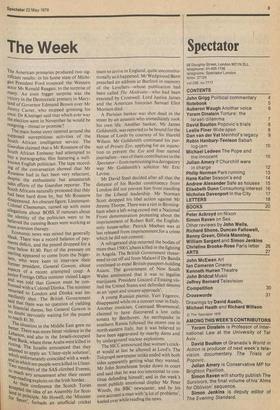The Week
The American primaries produced two significant results: in his home state of Michigan President Ford trounced the Western actor Mr Ronald Reagan, to the surprise of many. An even bigger surprise was the victory in the Democratic primary in Maryland of Governor Edmund Brown over Mr Jimmy Carter, who stopped grinning for once. Dr Kissinger said that which ever way the election went in November he would be resigning—threat or promise?
The main home story centred around the
supposed surreptitious activities of the South African intelligence service. The Guardian claimed that a Mr Roussow of the South African Embassy had attempted to buy a pornographic film featuring a wellknown English politician. The tape recording of the conversation showed that Mr Roussow had in fact been very reluctant, desPite the enthusiastic but amateurish sales efforts of the Guardian reporter. The South Africans naturally protested that they had been hard done by, but Mr Roussow disappeared. An obscure figure, LieutenantColonel Cheeseman, turned up with more allegations about BOSS. If rumours about the identity of the politician were to be believed the cunning Boers were working at Mass aversion therapy.
Economic news was mixed but generally
bleak. There was a record balance of payments deficit, and the pound dropped for a time below 81.80. Part of the pressure on sterling appeared to come from the Nigerians, who were keen to interview their former president, General Gowon, about aspects of a recent attempted coup. A jaurd°r Foreign Office minister visited Lagos Fd Was told that Gowon must be conrooted with a Colonel Dimka. The minister returned to London and Dimka was immediately shot. The British Government taid that there was no question of yielding o,financial duress, but General Gowon is o" , doubt nervously waiting for the pound to reach $1.70. , The situation in the Middle East grew no Lnetbter. There was more bitter violence in the \„‘ anon, and also in the Israeli-occupied rtoets.t Bank, where three Arabs were killed in pla‘oinng,i* The Israelis announced that they vvhi,7,eu to apply an 'Ulster-style solution', i cod`" unfortunately coincided with a weekten people were killed in Ulster. to ° members of the SAS climbed Everest, mar: tirch wrY amusement after their recent is:t'e,a,ding exploits on the Irish border. ace._ eir conference the Scotch Tories lanc113.ted the idea of an Assembly for Scot for Principle. Mr Howell, the 'Minister r ..)Dore, forbade an unofficial cricket
team to arrive in England, quite unconstitutionally as it happened. Mr Wedgwood Ben n preached an address at Burford in memory of the Levellers—whose publication had been called The Moderate—who had been executed by Cromwell. Lord Justice James and the American historian Samuel Eliot Morison died.
A Parisian banker was shot dead in the street by an assassin who immediately took his own life. Another banker, Mr James Goldsmith, was reported to be bound for the House of Lords by courtesy of Sir Harold Wilson. Mr Goldsmith continued his pur suit of Private Eye, applying for an injunction to prevent the Eye and four named journalists—two of them contributors to the Spectator—from mentioning in a derogatory way Mr Goldsmith's solicitor Mr Eric Levine.
Mr David Steel decided after all that the distance of his Border constituency from London did not prevent him from standing for the Liberal leadership. Mr Norman Scott dropped his libel action against Mr Jeremy Thorpe. There was a riot in Birmingham when a left-wing crowd met a National Front demonstration protesting about the imprisonment of Robert Relf, the Englishonly house-seller. Patrick Meehan was at last released from imprisonmentfor a crime which he did not commit.
A refrigerated ship returned the bodies of more than 1500 Cubans killed in the fighting in Angola. The British Government threatened to cut off aid from Malawi if Dr Banda continued to expel British-passport-holding Asians. The government of New South Wales announced that it was to legalise marijuana. President Giscard d'Estaing visited the United States and defended détente as an 'open and sincere approach'.
A young Russian pianist, Yuri Yegorov, disappeared while on a concert tour in Italy. Another musician, Coenraad Bloemencal, claimed to have discovered a lost cello sonata by Beethoven. An earthquake in southern Russia followed the recent one in north-eastern Italy, but it was believed to have been aggravated by nearby dams and by underground nuclear explosions. The MCC announced that women's cricket would at last be allowed at Lord's. The Telegraph newspaper strike ended with both sides apparently getting what they wanted. Mr John Stonehouse broke down in court and said that he was too emotional to continue defending himself; and in the week's most publicly emotional display Mr Peter Woods, the BBC newscaster, and by his own account a man with 'a lot of problems', keeled over while reading the news.


































 Previous page
Previous page